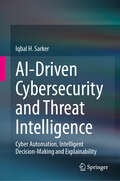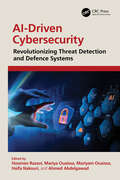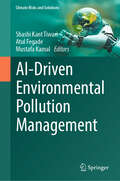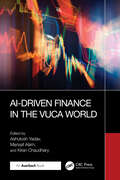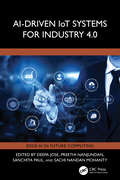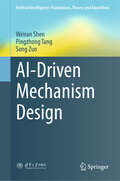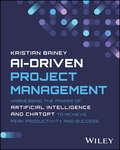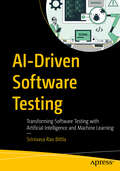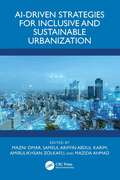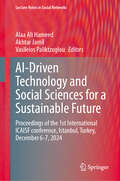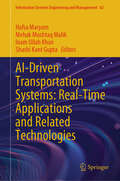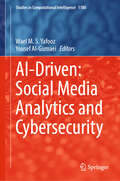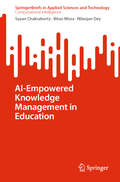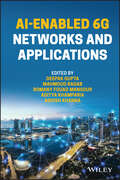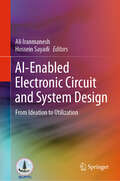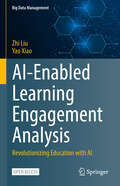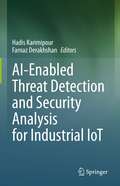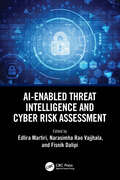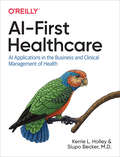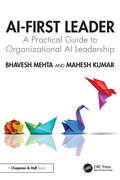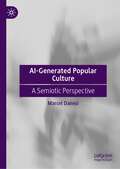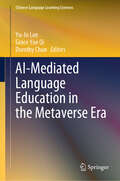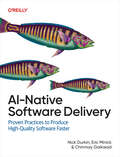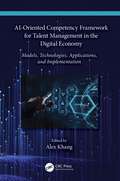- Table View
- List View
AI-Driven Cybersecurity and Threat Intelligence: Cyber Automation, Intelligent Decision-Making and Explainability
by Iqbal H. SarkerThis book explores the dynamics of how AI (Artificial Intelligence) technology intersects with cybersecurity challenges and threat intelligence as they evolve. Integrating AI into cybersecurity not only offers enhanced defense mechanisms, but this book introduces a paradigm shift illustrating how one conceptualize, detect and mitigate cyber threats. An in-depth exploration of AI-driven solutions is presented, including machine learning algorithms, data science modeling, generative AI modeling, threat intelligence frameworks and Explainable AI (XAI) models. As a roadmap or comprehensive guide to leveraging AI/XAI to defend digital ecosystems against evolving cyber threats, this book provides insights, modeling, real-world applications and research issues. Throughout this journey, the authors discover innovation, challenges, and opportunities. It provides a holistic perspective on the transformative role of AI in securing the digital world.Overall, the useof AI can transform the way one detects, responds and defends against threats, by enabling proactive threat detection, rapid response and adaptive defense mechanisms. AI-driven cybersecurity systems excel at analyzing vast datasets rapidly, identifying patterns that indicate malicious activities, detecting threats in real time as well as conducting predictive analytics for proactive solution. Moreover, AI enhances the ability to detect anomalies, predict potential threats, and respond swiftly, preventing risks from escalated. As cyber threats become increasingly diverse and relentless, incorporating AI/XAI into cybersecurity is not just a choice, but a necessity for improving resilience and staying ahead of ever-changing threats. This book targets advanced-level students in computer science as a secondary textbook. Researchers and industry professionals working in various areas, such as Cyber AI, Explainable and Responsible AI, Human-AI Collaboration, Automation and Intelligent Systems, Adaptive and Robust Security Systems, Cybersecurity Data Science and Data-Driven Decision Making will also find this book useful as reference book.
AI-Driven Cybersecurity: Revolutionizing Threat Detection and Defence Systems
by Ahmed Abdelgawad Mariya Ouaissa Mariyam Ouaissa Hooman Razavi Haïfa NakouriThis book delves into the revolutionary ways in which AI-driven innovations are enhancing every aspect of cybersecurity, from threat detection and response automation to risk management and endpoint protection. As AI continues to evolve, the synergy between cybersecurity and artificial intelligence promises to reshape the landscape of digital defence, providing the tools needed to tackle complex, ever-evolving cyber threats. Designed for professionals, researchers, and decision-makers, this book emphasizes that understanding and leveraging AI in cybersecurity is not just advantageous—it is essential for building robust, future-proof defences in a world where digital security is paramount.
AI-Driven Environmental Pollution Management (Climate Risks and Solutions)
by Shashi Kant Tiwari Atul Fegade Mustafa KamalThis book provides a comprehensive overview of the challenges caused by environmental pollution on a global scale, and delves into the intricate sources of air, water, and noise pollution. It discusses cutting-edge technologies such as IoT-based systems and AI integration for pollution detection and monitoring networks. With a focus on machine learning and deep learning models, the book provides insights into assessing, predicting, and mitigating the impact of pollution. Furthermore, it examines the implementation of AI-driven strategies for pollution control and reduction, alongside considerations for urban planning and sustainable infrastructure development. This indispensable resource navigates the social, policy, and economic implications of employing AI in environmental governance, emphasizing the importance of global cooperation for effective pollution management. The book will help readers to:1. Understand the adverse effect of environmental pollution in the era of new age. 2. Implement advanced management techniques that integrate sustainability into various environmental business economics.3. Explore effective environmental control and mitigation strategies using Internet of Things technologies and data analytics.4. Leverage AI/ML/DL for accurate environmental monitoring, modelling, prediction and decision-making.5. Navigate the complexities of Industry 4.0 to achieve sustainable development goals.
AI-Driven Finance in the VUCA World
by Mansaf Alam Kiran Chaudhary Ashutosh YadavIn today’s world, characterized by volatility, uncertainty, complexity, and ambiguity (VUCA), traditional finance is no longer sufficient to meet the challenges of fast-paced and interconnected global markets. To thrive in this dynamic environment, financial institutions, professionals, and policymakers are increasingly turning to AI. AI-Driven Finance in the VUCA World explores how AI is becoming ever more critical in the financial industry.This book looks at the impact of AI on investment strategies. AI-powered algorithms exhibit the capacity to scrutinize extensive datasets to unveil masked patterns and investment opportunities. From quantitative trading algorithms adept at capitalizing on market inefficiencies to robot-advisors offering individualized investment counsel, AI profoundly reconfigures the investment landscape. In a VUCA world, risk management is paramount, and regulatory scrutiny is tighter than ever. AI’s ability to assess risks in real time is critical in identifying anomalies and predicting potential crises. The book examines how AI enhances risk assessment, fraud detection, and compliance to provide institutions with a proactive edge in safeguarding operations and assets. This text also looks at the following: AI-driven chatbots, virtual assistants, and recommendation engines that revolutionize customer interactions, enhance engagement, and improve retention rates The ethical challenges surrounding AI in finance, including bias in algorithms, data privacy, and the responsible use of AI Case studies on how AI can solve specific industry challenges and drive innovation The future of finance is intertwined with AI, and this book looks to this future by discussing emerging trends and possibilities. It explores the potential of quantum computing in finance, the role of AI in sustainability and ESG investing, and the implications of AI-powered regulatory technologies. Seeking to provide valuable insights for financial professionals, the book is equally valuable to researchers, policymakers, and anyone interested in the future of finance. It bridges the gap between theory and practice, offering actionable insights that can be immediately applied in the real world.
AI-Driven IoT Systems for Industry 4.0 (ISSN)
by Sachi Nandan Mohanty Preethi Nanjundan Deepa Jose Sanchita PaulThe purpose of this book is to discuss the trends and key drivers of Internet of Things (IoT) and artificial intelligence (AI) for automation in Industry 4.0. IoT and AI are transforming the industry thus accelerating efficiency and forging a more reliable automated enterprise. AI-driven IoT systems for Industry 4.0 explore current research to be carried out in the cutting-edge areas of AI for advanced analytics, integration of industrial IoT (IIoT) solutions and Edge components, automation in cyber-physical systems, world leading Industry 4.0 frameworks and adaptive supply chains, etc.A thorough exploration of Industry 4.0 is provided, focusing on the challenges of digital transformation and automation. It covers digital connectivity, sensors, and the integration of intelligent thinking and data science. Emphasizing the significance of AI, the chapter delves into optimal decision-making in Industry 4.0. It extensively examines automation and hybrid edge computing architecture, highlighting their applications. The narrative then shifts to IIoT and edge AI, exploring their convergence and the use of edge AI for visual insights in smart factories. The book concludes by discussing the role of AI in constructing digital twins, speeding up product development lifecycles, and offering insights for decision-making in smart factories. Throughout, the emphasis remains on the transformative impact of deep learning and AI in automating and accelerating manufacturing processes within the context of Industry 4.0.This book is intended for undergraduates, postgraduates, academicians, researchers, and industry professionals in industrial and computer engineering.
AI-Driven Mechanism Design (Artificial Intelligence: Foundations, Theory, and Algorithms)
by Weiran Shen Pingzhong Tang Song ZuoDue to its huge success in industry, mechanism design has been one of the central research topics at the interface of economics and computer science. However, despite decades of effort, there are still numerous challenges, in terms of both theory and applications. These include the problem of how to design mechanisms for selling multiple items, dynamic auctions, and balancing multiple objectives, given the huge design space and buyer strategy space; and the fact that in practice, the most widely applied auction format (the generalized second price auction) is neither truthful nor optimal. Furthermore, many theoretical results are based upon unrealistic assumptions that do not hold in real applications. This book presents the AI-driven mechanism design framework, which aims to provide an alternative way of dealing with these problems. The framework features two abstract models that interact with each other: the agent model and the mechanism model. By combining AI techniques with mechanism design theory, it solves problems that cannot be solved using tools from either domain alone. For example, it can reduce the mechanism space significantly, build more realistic buyer models, and better balance different objectives. The book focuses on several aspects of mechanism design and demonstrates that the framework is useful in both theoretical analysis and practical applications.
AI-Driven Project Management: Harnessing the Power of Artificial Intelligence and ChatGPT to Achieve Peak Productivity and Success
by Kristian BaineyAccelerate your next project with artificial intelligence and ChatGPT In AI-Driven Project Management: Harnessing the Power of Artificial Intelligence and ChatGPT to Achieve Peak Productivity and Success, veteran IT and project management advisor Kristian Bainey delivers an insightful collection of strategies for automating the administration and management of projects. In the book, the author focuses on four key areas where project leaders can achieve improved results with AI's data-centric capabilities: minimizing surprises, minimizing bias, increasing standards, and accelerating decision making. You'll also find: Primers on the role of AI and ChatGPT in Agile, Hybrid, and Predictive approaches to project management How to accurately forecast a project with ChatGPT Techniques for crafting impactful AI strategy using AI project management principles Perfect for managers, executives, and business leaders everywhere, AI-Driven Project Management is also a must-read for project management professionals, tech professionals and enthusiasts, and anyone else interested in the intersection of artificial intelligence, machine learning, and project management.
AI-Driven Software Testing: Transforming Software Testing with Artificial Intelligence and Machine Learning
by Srinivasa Rao BittlaAI-Driven Software Testing explores how Artificial Intelligence (AI) and Machine Learning (ML) are revolutionizing quality engineering (QE), making testing more intelligent, efficient, and adaptive. The book begins by examining the critical role of QE in modern software development and the paradigm shift introduced by AI/ML. It traces the evolution of software testing, from manual approaches to AI-powered automation, highlighting key innovations that enhance accuracy, speed, and scalability. Readers will gain a deep understanding of quality engineering in the age of AI, comparing traditional and AI-driven testing methodologies to uncover their advantages and challenges. Moving into practical applications, the book delves into AI-enhanced test planning, execution, and defect management. It explores AI-driven test case development, intelligent test environments, and real-time monitoring techniques that streamline the testing lifecycle. Additionally, it covers AI&’s impact on continuous integration and delivery (CI/CD), predictive analytics for failure prevention, and strategies for scaling AI-driven testing across cloud platforms. Finally, it looks ahead to the future of AI in software testing, discussing emerging trends, ethical considerations, and the evolving role of QE professionals in an AI-first world. With real-world case studies and actionable insights, AI-Driven Software Testing is an essential guide for QE engineers, developers, and tech leaders looking to harness AI for smarter, faster, and more reliable software testing. What you will learn: • What are the key principles of AI/ML-driven quality engineering • What is intelligent test case generation and adaptive test automation • Explore predictive analytics for defect prevention and risk assessment • Understand integration of AI/ML tools in CI/CD pipelines Who this book is for: Quality Engineers looking to enhance software testing with AI-driven techniques. Data Scientists exploring AI applications in software quality assurance and engineering. Software Developers – Engineers seeking to integrate AI/ML into testing and automation workflows.
AI-Driven Strategies for Inclusive and Sustainable Urbanization
by Mazni Omar Amirulikhsan Zolkafli Mazida Ahmad Karim, Samsul Ariffin AbdulThis book explores the transformative potential of artificial intelligence (AI) in reshaping urban development practices. Its objective is to provide a comprehensive overview of the latest advancements in AI‑driven strategies for urban development and governance, with a focus on promoting inclusivity, sustainability, and resilience in cities worldwide. This book studies how AI technologies can be utilized to tackle the complex challenges encountered in urban areas, spanning ethical, social, and environmental implications across urban governance and beyond.The in‑depth analysis in this book uncovers the potential of AI in addressing longstanding challenges and seizing new opportunities in urban contexts, offering insights into wide‑ranging applications. For the use of AI in urban planning, the authors showcase applications that help reduce environmental impact while enhancing accessibility for underserved communities by analyzing real‑time data on land use, transportation, and population needs. Another topic in this book examines AI‑powered urban mobility systems, utilizing software that integrates real‑time data to create adaptive transportation networks. These systems offer efficient, eco‑friendly travel solutions tailored to diverse populations, including individuals with disabilities, by dynamically adjusting routes and services. Additionally, this book delves into digital inclusion and accessible technologies in smart cities, highlighting software that prioritizes accessibility and digital inclusion, ensuring that all residents, regardless of ability, can fully participate in urban life. The interdisciplinary approach allows readers to understand how different fields, such as technology, urban planning, and social policy, intersect and shape AI‑driven urban development. By weaving together insights from these diverse areas, this book demonstrates how AI can address real‑world challenges, from improving infrastructure to fostering sustainability and inclusivity in cities. This perspective helps readers grasp the broader impact of AI, showing how it can enhance various aspects of urban life, including social equity and environmental resilience.Through interdisciplinary research, case studies, and expert insights, this book aims to educate students in higher learning and inspire policymakers, urban planners, and practitioners to leverage AI technologies in addressing urban challenges and build better cities for all residents.
AI-Driven Technology and Social Sciences for a Sustainable Future: Proceedings of the 1st International ICAISF conference, Istanbul, Turkey, December 6-7, 2024 (Lecture Notes in Social Networks)
by Akhtar Jamil Alaa Ali Hameed Vasileios PaliktzoglouThis book presents a multidisciplinary exploration of sustainable development, integrating themes such as environmental management, social sciences, and AI-driven technology. It covers innovative approaches to sustainability in agriculture, biodiversity, energy, and urban planning, while addressing social equity, human rights, and the role of education. The book also highlights the impact of AI and technology on public health, resource management, and smart cities, alongside discussions on governance, policy, and ethical dimensions of sustainability. With contributions on economic growth, public health, and environmental justice, it serves as a comprehensive guide for advancing global sustainability initiatives.
AI-Driven Transportation Systems: Real-Time Applications and Related Technologies (Information Systems Engineering and Management #62)
by Inam Ullah Khan Shashi Kant Gupta Mehak Mushtaq Malik Hafsa MaryamIn today&’s rapidly advancing technological landscape, the integration of Artificial Intelligence (AI) and Intelligent Transportation Systems (ITS) is revolutionizing transportation. This integration is reshaping ITS by enhancing accuracy and reliability, enabling efficient navigation, and optimizing both traffic and public transport management. AI-Driven Transportation Systems: Real-Time Applications & Related Technologies explores the powerful synergy between AI and modern transportation infrastructures, highlighting their transformative impact on traffic management, autonomous vehicles, and real-time decision-making. This book delves into the next generation of transportation systems, where AI-driven solutions enhance efficiency, safety, and sustainability. From intelligent traffic monitoring and predictive analytics to autonomous navigation and smart city applications, AI is redefining how transportation networks operate, ensuring seamless connectivity and optimized resource utilization. The authors provide in-depth analyses of emerging trends, addressing the challenges of AI integration in ITS, along with ethical considerations and anticipated future advancements. With a focus on cutting-edge research and real-world applications, this book serves as an essential resource for researchers, engineers, policymakers, and professionals interested in the future of AI-powered transportation. Whether you are exploring the potential of AI in transportation or seeking to understand the future of ITS, this book is your gateway to the next era of smart and connected transportation networks.
AI-Driven: Social Media Analytics and Cybersecurity (Studies in Computational Intelligence #1180)
by Wael M. S. Yafooz Yousef Al-GumaeiThis book presents state-of-the-art research, conceptual frameworks, and practical solutions, focusing on the intersection of these vital fields. The ever-evolving digital landscape has fostered a close relationship between social media and cybersecurity. Both social media analytics and cybersecurity are prominent research areas that shape the lives of individuals, organizations, and communities. It covers three key categories: First, social media analytics, which explores how data from platforms like Twitter and Facebook is harnessed for insights, sentiment analysis, and trend predictions. Second, cybersecurity and digital safety, which addresses emerging threats and explores tools and strategies to secure digital spaces. Third, advanced technologies and their broader impacts, which examines the technologies shaping social media platforms. This book is an invaluable resource for researchers, professionals, and students, providing comprehensive insights into the application of advanced technologies and analytical techniques for safeguarding digital environments. It is essential reading for anyone interested in social media analytics, digital safety, and the future of technology.
AI-Empowered Knowledge Management in Education (SpringerBriefs in Applied Sciences and Technology)
by Nilanjan Dey Sayan Chakraborty Bitan MisraThis book explains basic ideas behind several methods used in artificial intelligence-based knowledge management techniques. It also shows how these techniques are applied in practical contexts in different education sectors. The book discusses AI-based knowledge management applications, AI-empowered knowledge management in primary and higher education, and technical and ethical challenges and opportunities.
AI-Enabled 6G Networks and Applications
by Deepak Gupta Ashish Khanna Aditya Khamparia Mahmoud Ragab Romany Fouad MansourAI-ENABLED 6G NETWORKS AND APPLICATIONS Provides authoritative guidance on utilizing AI techniques in 6G network design and optimization Written and edited by active researchers, this book covers hypotheses and practical considerations and provides insights into the design of evolutionary AI algorithms for 6G networks, with focus on network transparency, interpretability and simulatability for vehicular networks, space systems, surveillance systems and their usages in different emerging engineering fields. AI-Enabled 6G Networks and Applications includes a review of AI techniques for 6G Networks and will focus on deployment of AI techniques to efficiently and effectively optimize the network performance, including AI-empowered mobile edge computing, intelligent mobility and handover management, and smart spectrum management. This book includes the design of a set of evolutionary AI hybrid algorithms with communication protocols, showing how to use them in practice to solve problems relating to vehicular networks, aerial networks, and communication networks. Reviews various types of AI techniques such as AI-empowered mobile edge computing, intelligent handover management, and smart spectrum management Describes how AI techniques manage computation efficiency, algorithm robustness, hardware development, and energy management Identifies and provides solutions to problems in current 4G/5G networks and emergent 6G architectures Discusses privacy and security issues in IoT-enabled 6G Networks Examines the use of machine learning to achieve closed-loop optimization and intelligent wireless communication AI-Enabled 6G Networks and Applications is an essential reference guide to advanced hybrid computational intelligence methods for 6G supportive networks and protocols, suitable for graduate students and researchers in network forensics and optimization, computer science, and engineering.
AI-Enabled Electronic Circuit and System Design: From Ideation to Utilization
by Ali Iranmanesh Hossein SayadiAs our world becomes increasingly digital, electronics underpin nearly every industry. Understanding how AI enhances this foundational technology can unlock innovations, from smarter homes to more powerful gadgets, offering vast opportunities for businesses and consumers alike. This book demystifies how AI streamlines the creation of electronic systems, making them smarter and more efficient. With AI&’s transformative impact on various engineering fields, this resource provides an up-to-date exploration of these advancements, authored by experts actively engaged in this dynamic field. Stay ahead in the rapidly evolving landscape of AI in engineering with &“AI-Enabled Electronic Circuit and System Design: From Ideation to Utilization,&” your essential guide to the future of electronic systems. A transformative guide describing how revolutionizes electronic design through AI integration. Highlighting trends, challenges and opportunities; Demystifies complex AI applications in electronic design for practical use; Leading insights, authored by top experts actively engaged in the field; Offers a current, relevant exploration of significant topics in AI&’s role in electronic circuit and system design. Editor&’s bios. Dr. Ali A. Iranmanesh is the founder and CEO of Silicon Valley Polytechnic Institute. He has received his Bachelor of Science in Electrical Engineering from Sharif University of Technology (SUT), Tehran, Iran, and both his master&’s and Ph.D. degrees in Electrical Engineering and Physics from Stanford University in Stanford, CA. He additionally holds a master&’s degree in business administration (MBA) from San Jose State University in San Jose, CA. Dr. Iranmanesh is the founder and chairman of the International Society for Quality Electronic Design (ISQED). Currently, he serves as the CEO of Innovotek. Dr. Iranmanesh has been instrumental in advancing semiconductor technologies, innovative design methodologies, and engineering education. He holds nearly 100 US and international patents, reflecting his signifi cant contributions to the field. Dr. Iranmanesh is the Senior life members of EEE, senior member of the American Society for Quality, co-founder and Chair Emeritus of the IEEE Education Society of Silicon Valley, Vice Chair Emeritus of the IEEE PV chapter, and recipient of IEEE Outstanding Educator Award. Dr. Hossein Sayadi is a Tenure-Track Assistant Professor and Associate Chair in the Department of Computer Engineering and Computer Science at California State University, Long Beach (CSULB). He earned his Ph.D. in Electrical and Computer Engineering from George Mason University in Fairfax, Virginia, and an M.Sc. in Computer Engineering from Sharif University of Technology in Tehran, Iran. As a recognized researcher with over 14 years of research experience, Dr. Sayadi is the founder and director of the Intelligent, Secure, and Energy-Efficient Computing (iSEC) Lab at CSULB. His research focuses on advancing hardware security and trust, AI and machine learning, cybersecurity, and energy-efficient computing, addressing critical challenges in modern computing and cyber-physical systems. He has authored over 75 peer-reviewed publications in leading conferences and journals. Dr. Sayadi is the CSU STEM-NET Faculty Fellow, with his research supported by multiple National Science Foundation (NSF) grants and awards from CSULB and the CSU Chancellor&’s Office. He has contributed to various international conferences as an organizer and program committee member, including as the TPC Chair for the 2024 and 2025 IEEE ISQ
AI-Enabled Learning Engagement Analysis: Revolutionizing Education with AI (Big Data Management)
by Zhi Liu Yao XiaoArtificial Intelligence (AI) is revolutionizing the education industry, particularly in understanding and enhancing student learning engagement in online learning. The book aims to get an in-depth exploration into a three-stage framework of AI-enabled learning engagement analysis, which provides effective tools and methodologies for education researchers and practitioners, facilitating intelligent transformation and optimization. It delves into intelligent recognition, including emotional and cognitive engagement, supported by detailed algorithmic introductions and case studies. The book further examines the relationship between engagement and outcomes, covering cognition, emotion, self-regulation, and social network characteristics. Furthermore, it presents adaptive interventions, offering a comprehensive guide to leveraging AI for personalized learning experiences and improved learning outcomes. The book provides valuable insights and practical tools for enhancing teaching and learning outcomes. Whether you are an educator seeking to integrate AI into your teaching strategies or a researcher exploring the frontiers of educational technology, this book equips you with the knowledge and resources to navigate the evolving landscape of AI-enabled education. This publication underscores the significance of practical applications, presenting a compendium of pioneering research methodologies and case studies that elucidate the integration of AI and data analytics within pedagogical contexts. Whether the objective is to refine comprehension of online learning engagement dynamics or to deploy AI-infused strategies in educational settings, this text serves as an invaluable resource for revolutionizing education with AI. Chapter 2 is available for open access under a Creative Commons Attribution 4.0 International License via link.springer.com.
AI-Enabled Threat Detection and Security Analysis for Industrial IoT
by Hadis Karimipour Farnaz DerakhshanThis contributed volume provides the state-of-the-art development on security and privacy for cyber-physical systems (CPS) and industrial Internet of Things (IIoT). More specifically, this book discusses the security challenges in CPS and IIoT systems as well as how Artificial Intelligence (AI) and Machine Learning (ML) can be used to address these challenges. Furthermore, this book proposes various defence strategies, including intelligent cyber-attack and anomaly detection algorithms for different IIoT applications. Each chapter corresponds to an important snapshot including an overview of the opportunities and challenges of realizing the AI in IIoT environments, issues related to data security, privacy and application of blockchain technology in the IIoT environment. This book also examines more advanced and specific topics in AI-based solutions developed for efficient anomaly detection in IIoT environments. Different AI/ML techniques including deep representation learning, Snapshot Ensemble Deep Neural Network (SEDNN), federated learning and multi-stage learning are discussed and analysed as well. Researchers and professionals working in computer security with an emphasis on the scientific foundations and engineering techniques for securing IIoT systems and their underlying computing and communicating systems will find this book useful as a reference. The content of this book will be particularly useful for advanced-level students studying computer science, computer technology, cyber security, and information systems. It also applies to advanced-level students studying electrical engineering and system engineering, who would benefit from the case studies.
AI-Enabled Threat Intelligence and Cyber Risk Assessment
by Narasimha Rao Vajjhala Edlira Martiri Fisnik DalipiAI-Enabled Threat Intelligence and Cyber Risk Assessment delves into the transformative potential of artificial intelligence (AI) in revolutionizing cybersecurity, offering a comprehensive exploration of current trends, challenges, and future possibilities in mitigating cyber risks. This book brings together cutting-edge research and practical insights from an international team of experts to examine how AI technologies are reshaping threat intelligence, safeguarding data, and driving digital transformation across industries. The book covers a broad spectrum of topics, including AI-driven fraud prevention in digital marketing, strategies for building customer trust through data privacy, and the role of AI in enhancing educational and healthcare cybersecurity systems. Through in-depth analyses and case studies, this book highlights the barriers to AI adoption, the legal and ethical considerations, and the development of resilient cybersecurity frameworks.Special emphasis is given to regional insights, such as the digital transformation of Kazakh businesses and the integration of AI in diverse global contexts, offering valuable lessons for researchers, policymakers, and practitioners. From safeguarding patient data in healthcare to addressing automated threats in digital marketing, this book provides actionable strategies and emerging perspectives on the evolving landscape of AI in risk management. Designed for academics, professionals, and students, AI-Enabled Threat Intelligence and Cyber Risk Assessment serves as an essential resource for understanding the intersection of AI, cybersecurity, and risk assessment. With contributions from leading researchers across various disciplines, this book underscores the critical role of AI in building resilient, ethical, and innovative solutions to today’s most pressing cybersecurity challenges.
AI-First Healthcare
by Kerrie L. Holley Siupo BeckerAI is poised to transform every aspect of healthcare, including the way we manage personal health, from customer experience and clinical care to healthcare cost reductions. This practical book is one of the first to describe present and future use cases where AI can help solve pernicious healthcare problems.Kerrie Holley and Siupo Becker provide guidance to help informatics and healthcare leadership create AI strategy and implementation plans for healthcare. With this book, business stakeholders and practitioners will be able to build knowledge, a roadmap, and the confidence to support AIin their organizations—without getting into the weeds of algorithms or open source frameworks.Cowritten by an AI technologist and a medical doctor who leverages AI to solve healthcare’s most difficult challenges, this book covers:The myths and realities of AI, now and in the futureHuman-centered AI: what it is and how to make it possibleUsing various AI technologies to go beyond precision medicineHow to deliver patient care using the IoT and ambient computing with AIHow AI can help reduce waste in healthcareAI strategy and how to identify high-priority AI application
AI-First Leader: A Practical Guide to Organizational AI Leadership
by Mahesh Kumar Bhavesh MehtaAI-First Leader: A Practical Guide to Organizational AI Leadership is a practical guide for executives, technology leaders, and decision- makers seeking to turn artificial intelligence into a strategic advantage. As AI rapidly reshapes how organizations operate and compete, this book provides a clear roadmap from initial awareness to enterprise-wide adoption. It equips leaders with the tools to navigate both the promise and complexity of today’s AI landscape, including machine learning, generative AI, and autonomous systems.Blending technical clarity with strategic insight, the book is anchored in real-world frameworks and brought to life through the fictional yet highly realistic case study of NovaBridge Health, a mid-sized healthcare system navigating the risks and rewards of AI transformation. Through this narrative, readers gain firsthand insights into overcoming early missteps, building trust, aligning AI systems with KPIs, and scaling responsibly in regulated environments. Topics span foundational and advanced concepts, from data governance, model evaluation, and prompt engineering to the deployment of AI agents, resilient infrastructure, and responsible AI practices. Actionable insights, decision frameworks, and sector-specific examples help leaders bridge the gap between innovation and execution.Written for CEOs, CTOs, product managers, and innovation leads, AI-First Leader: A Practical Guide to Organizational AI demystifies AI without diluting its complexity. Whether you’re building your first chatbot, deploying generative search and co-pilots, or shaping guardrails for enterprise-wide use, this book provides the blueprint to lead with AI strategically, responsibly, and at scale.
AI-Generated Popular Culture: A Semiotic Perspective
by Marcel DanesiThis book gives a general overview of Artificial Intelligence as it is impacting on the world of the arts and culture. What is AI-generated pop culture? What does a movie, a musical work, a novel, or song created entirely by a generative AI imply in terms of our notions of creativity? What is the semiotic dynamic (the meaning-making impulse that humans imprint in sign and textual forms) that is involved in an AI-produced work? No comprehensive treatment exists of the profound implications that AI-generated pop culture entails, including how it might affect cultural evolution and how we interpret artistic artifacts. Such a treatment is critical at this moment, and this book aims to fill this gap.
AI-ML for Decision and Risk Analysis: Challenges and Opportunities for Normative Decision Theory (International Series in Operations Research & Management Science #345)
by Louis Anthony Cox Jr.This book explains and illustrates recent developments and advances in decision-making and risk analysis. It demonstrates how artificial intelligence (AI) and machine learning (ML) have not only benefitted from classical decision analysis concepts such as expected utility maximization but have also contributed to making normative decision theory more useful by forcing it to confront realistic complexities. These include skill acquisition, uncertain and time-consuming implementation of intended actions, open-world uncertainties about what might happen next and what consequences actions can have, and learning to cope effectively with uncertain and changing environments. The result is a more robust and implementable technology for AI/ML-assisted decision-making.The book is intended to inform a wide audience in related applied areas and to provide a fun and stimulating resource for students, researchers, and academics in data science and AI-ML, decision analysis, and other closely linked academic fields. It will also appeal to managers, analysts, decision-makers, and policymakers in financial, health and safety, environmental, business, engineering, and security risk management.
AI-Mediated Language Education in the Metaverse Era (Chinese Language Learning Sciences)
by Yu-Ju Lan Grace Yue Qi Dorothy ChunThis book provides open discussions and dialogues around the latest research and development on applying AI and ubiquitous technologies into various language learning contexts. Living in the Metaverse era, arguably a turning point in the evolution of the Internet, it is vital for researchers and practitioners to rethink and reconsider human and AI relationships in transforming the way we teach, learn, and live in everyday life. Reinders et al. (2022) amongst Computer Assisted Language Learning (CALL) researchers have emphasised the need to conduct more research on language learning in the classroom and beyond that makes real connections with what language learners do for their learning today. More importantly, language educators must find ways to support language learning in this new era. What is urgently needed is a consolidation and synthesis of theoretical foundations, visions and the latest research findings and practices on the integration of AI and ubiquitous technologies and language education from diverse perspectives. This book, comprising of contributions regarding contextualised AI-mediated language learning and teaching, provides researchers, practitioners, and teacher educators with an opportunity to closely engage in research-informed practices and intellectual dialogues on potential opportunities and challenges in the Metaverse era. It also helps to facilitate the development of equitable, sustainable, and just practices for the diversity of language learners today.
AI-Native Software Delivery: Proven Practices to Produce High-Quality Software Faster
by Nick Durkin Eric Minick Chinmay GaikwadAI coding assistants are helping teams create software faster than ever. But to turn that speed into real innovation, organizations must go beyond writing code and deliver software quickly, securely, and reliably. While AI-assisted coding is now mainstream, what happens after the code is written is still catching up. AI-Native Software Delivery is your practical guide to applying AI across the entire delivery lifecycle, from commit to production and beyond. Written for software engineers, DevOps leaders, and tech executives, this book explores how leading teams are using AI to streamline CI/CD, manage cloud costs, strengthen security, and eliminate operational toil. The book also uncovers the risks of brittle automation and shows you how to avoid building systems that don't scale. You'll learn how to: Integrate AI across delivery workflows to accelerate time to value Avoid common pitfalls of fragmented automation strategies Adopt DevSecOps principles that scale with your team Apply real-world practices in AIOps, chaos engineering, and SRE Future-proof your delivery with intelligent pipelines and feedback loops Whether you're evolving a legacy delivery process or designing a new platform, this guide will help you lead your organization into the AI-native future of software delivery.
AI-Oriented Competency Framework for Talent Management in the Digital Economy: Models, Technologies, Applications, and Implementation
by Alex KhangIn the digital-driven economy era, an AI-oriented competency framework (AIoCF) is a collection to identify AI-oriented knowledge, attributes, efforts, skills, and experiences (AKASE) that directly and positively affect the success of employees and the organization. The application of skills-based competency analytics and AI-equipped systems is gradually becoming accepted by business and production organizations as an effective tool for automating several managerial activities consistently and efficiently in developing and moving the capacity of a company up to a world-class level.AI-Oriented Competency Framework for Talent Management in the Digital Economy: Models, Technologies, Applications, and Implementation discusses all the points of an AIoCF, which includes predictive analytics, advisory services, predictive maintenance, and automated processes, which help to make the operations of project management, personnel management, or administration more efficient, profitable, and safe. The book includes the functionality of emerging career pathways, hybrid learning models, and learning paths related to the learning and development of employees in the production or delivery fields. It also presents the relationship between skills taxonomy and competency framework with interactive methods using datasets, processing workflow diagrams, and architectural diagrams for easy understanding of the application of intelligent functions in role-based competency systems. By also covering upcoming areas of AI and data science in many government and private organizations, the book not only focuses on managing big data and cloud resources of the talent management system but also provides cybersecurity techniques to ensure that systems and employee competency data are secure.This book targets a mixed audience of students, engineers, scholars, researchers, academics, and professionals who are learning, researching, and working in the field of workforce training, human resources, talent management systems, requirement, headhunting, outsourcing, and manpower consultant services from different cultures and industries in the era of digital economy.
